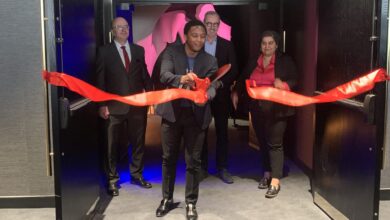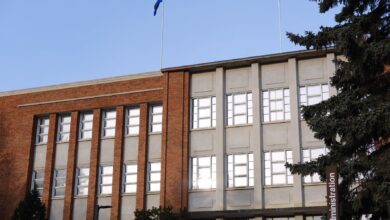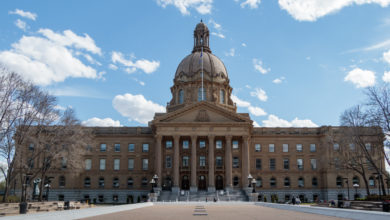U of A kicks off Pride Week with parade and festivities
“We're watching attempts to erode the progress that we've made in so many ways, politically and socially,” the Fyrefly Institute executive director says.
 Dylana Twittey
Dylana TwitteyOn March 11, approximately 200 people gathered by the Centennial Centre for Interdisciplinary Science (CCIS) for the University of Alberta’s annual Pride parade. The parade was the first of several events during Pride Week, held in collaboration with the Fyrefly Institute for Gender and Sexual Diversity. The Fyrefly Institute is a non-profit organization based in the Faculty of Education at the U of A. It provides programs and services to support the 2SLGBTQ+ community.
In her introductory remarks, Yasmine Abdel Razek, the Fyrefly Institute’s communications and events coordinator, expressed gratitude to community members and volunteers for their efforts in “[coordinating] a week that acknowledges and celebrates the 2SLGBTQ+ community.”
“This year, we’re framing [the parade] as an act of solidarity with our Two-Spirit, transgender, and gender-diverse community, who need our support now more than ever,” Abdel Razek said.
Abdel Razek added that this year marks the Fyrefly Institute’s 20th anniversary.
“It’s been 20 years of advocating for the queer and trans community. We’re not done yet.”
“Pride Week is an act of wahkohtowin — an opportunity of kin-making,” Whiskeyjack says
Lana Whiskeyjack, an associate professor in the Faculty of Arts and the department of women and gender studies, is from Saddle Lake Cree Nation. She started the opening ceremony with a blessing song.
In her speech, Whiskeyjack highlighted the importance of the Cree language, which she described as non-binary, relational, and verb-based.
“There is no ‘he’ [or] ‘she.’ There’s only ‘you, me, they, them, [and] us,’” Whiskeyjack explained. She connected this relation-based approach to language to ‘wahkohtowin,’ a Cree term which refers to kinship beyond the family.
According to Whiskeyjack, the 2SLGBTQ+ “kin brings medicines to help remind us how to be better human beings [and] relatives.”
”Pride Week is an act of wahkohtowin — an opportunity of kin-making that Fyrefly … has been advocating and nurturing,” Whiskeyjack said. “I want to encourage you all to learn how to be better relatives. By evolving your language, your thoughts, your actions, your behaviours. And especially your kin-making skills.”
“The times now that we live in are particularly challenging. So coming together today, I think is enormously important,” Flanagan says
Next, Vice-provost (equity, diversity, and inclusion) Carrie Smith said that as a queer person, she received a “fair share of warning” before relocating to Alberta for her role as an assistant professor at the U of A.
“But when I arrived, I encountered a robust community of 2SLGBTQ+ faculty and staff,” Smith said. “I encountered leading researchers impacting areas such as intersectionality, queer studies, and transgender health.”
In addition, Smith said that the U of A must continue to ensure that “systems, structures, and spaces affirm gender-diverse identities [and] confirm that trans rights are human rights.”
“The U of A has a vibrant and storied history of supporting 2SLGBTQ+ allied students, faculty, and staff both on campus and beyond. And we stay committed to continuing this work together.”
U of A President and Vice-chancellor Bill Flanagan also spoke at the opening ceremony.
“The times now that we live in are particularly challenging. So coming together today, I think is enormously important,” Flanagan said. Flanagan added that he and his husband, Saffron Sri, were “really proud to stand-up together as a very happily married couple.”
“We have some potentially scary politics happening in this province right now. And we need you to speak up,” Fyrefly Institute executive director says
Lastly, Fyrefly Institute’s Executive Director, Glynnis Lieb, encouraged attendees to advocate for equity, particularly in light of global challenges facing the 2SLGBTQ+ community, Indigenous peoples, and other marginalized groups. She added that the Fyrefly Institute is working on new projects to shift the conversation about these groups and understand their depth.
“We’re not a monolith that [has] ‘resilience and struggle.’ We’re so much more than that,” Lieb said. “We need to have difficult conversations, we need to be political. We are seeing a global attack on the 2SLGBTQ+ community.”
Lieb said the 2SLGBTQ+ community is “disproportionately affected” by climate change, sexual and gender-based violence, and violence in the streets.
“It’s great for you to be here today. But we need you to make your voices heard. Challenge the people you vote for. Challenge the people you don’t vote for. We need to make sure that our voices are loud for those folks who aren’t in a place where they’re able to speak up right now.”
Finally, Lieb encouraged attendees to attend Edmonton’s City Hall on March 18 and engage with local government to create a 2SLGBTQ+ advisory committee.
“We urge you to get involved in that because while we’re standing here, we’re watching attempts to erode the progress that we’ve made in so many ways, politically and socially,” Lieb said. “Pride is a protest, folks. We need your voices.”
The parade ended in the Students’ Union Building (SUB) Cascade Room, where a resource fair and drag show were subsequently held.
“Especially during this time, it’s so important to remember that there is space for you,” Abdel Razek says
On January 31, the Government of Alberta announced new policies limiting gender-affirming health care for minors and transgender athletes’ sports participation. In an interview with The Gateway, Abdel Razek said that events like Pride Week are important for students during this time.
“We do have a lot of queer and trans students on campus. And I think the recent policy announcement was really heartbreaking, and very painful to hear,” Abdel Razek said. “I think these events are really important, because it’s a signal that they deserve to be here. Their identities are welcome. They are beautiful — deserving of affirmation and support.”
Although U of A Protective Services (UAPS) were present at the parade in case of counter-protestors, Abdel Razek said that this was just a precaution. She added that many individuals have approached her and talked positively about Pride Week.
”The parade definitely stood out to me,” she said. “We had over 500 people register, which was so nice to see that a lot of people were willing to come out of support.”
In addition, Abdel Razek mentioned that the drag show featured two performers from the Fyrefly Institute’s Community, Health, Empowerment, and Wellness (CHEW) project, which “supports queer and trans youth facing barriers like houselessness.”
“They performed really great and the environment was so lovely. Everyone was so energetic and happy. So [those were] the two highlights.”
For the remainder of Pride Week, the Fyrefly Institute collaborated with other groups on events including paint night, karaoke, and a coffee drop-in, Abdel Razek said.
“[This is] just to really show the community that we’re there to support them during this really difficult and uncertain time.”




